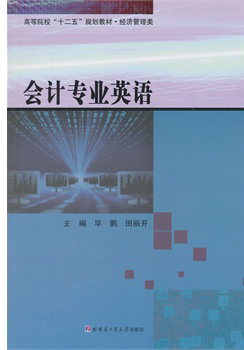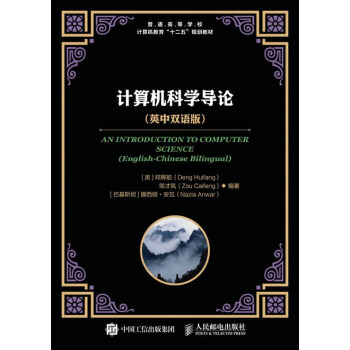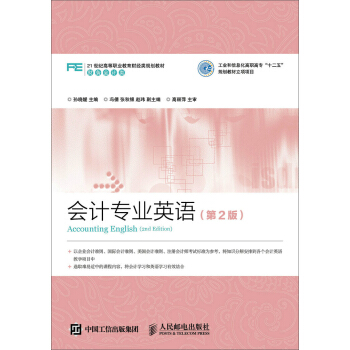- 哈尔滨工业大学出版社
- 9787560347417
- 179821
- 2014-06
- H31
内容简介
毕鹏、田丽开主编的这本《会计专业英语》以我国最新的会计准则为基础,兼顾国际会计准则和其他国家准则,适应目前我国经济管理人才培养的需要,用英语对会计的基本理论、会计循环及会计要素的确认、计量和报告进行了阐述。全书共分为17章,教学内容安排合理,克服了目前国外引进的原版教材篇幅大、价格高等不适合学习的缺点。此书注重学生的能力培养和学习的积极性、主动性的提高,为方便学生的学习,每章都附有学习目标、词汇、复习思考题等。
本书是会计学专业首选专业英语教材,也是双语教学不可或缺的教学资料。同时,可作为广大会计从业者掌握会计英文表达、读懂财务报告的学习资料,有助于提高使用者的会计工作水平及适应能力。
本书是会计学专业首选专业英语教材,也是双语教学不可或缺的教学资料。同时,可作为广大会计从业者掌握会计英文表达、读懂财务报告的学习资料,有助于提高使用者的会计工作水平及适应能力。
目录
Part 1 Accounting Introductions会计总论
Unit 1 Accounting and Its Environment会计与会计环境
1.1 Nature and Content of Accountin9
1.2 0bjectives of Financial Reportin9
Unit 2 Accounting Concepts and Basic Conventions会计概念与基本惯例
2.1 Accounting Is an Information System
2.2 Conventions of Accounting
Unit 3 Accounting Elements and Accounting Equation会计要素与会计等式
3.1 Accounting Elements
3.2 Accounting Equation
Unit 4 Accounts and Double-entry Bookkeeping System账户与复式记账法
4.1 The Account
4.2 Double-entry Bookkeeping System
Unit 5 Ledgers and Journals分类账与日记账
5.1 Ledgers
5.2 Journals
Unit 6 Recording Transactions Illustration记录交易实例
6.1 Illustrative Problem Ⅰ
6.2 Illustrative Problem Ⅱ
6.3 Illustrative Problem Ⅲ
6.4 Illustrative Problem Ⅳ
6.5 Illustrative Problem Ⅴ
6.6 Illustrative Problem Ⅵ
Unit 7 The Accounting Cycle会计循环
7.1 Fundamentals and Analyze Transactions
7.2 Record the Transactions in Journal
7.3 Post to Ledger Accounts
7.4 Prepare a Trial Balance
7.5 Make Adjusting Entries
7.6 Prepare Financial Statements
7.7 Journalize and Post Closing Entries
7.8 Prepared Closed Trial Balance
Unit 8 Financial Statements财务报表
8.1 Introduction to Financial Statements
8.2 The Balance Sheet
8.3 The Income Statement
8.4 The Cash Flow Statement
Part 2 Financial Accounting财务会计
Unit 9 Assets(I)—Current Assets资产(I)——流动资产
9.1 Internal Control and Cash
9.2 Reeeivables
9.3 Inventory(I)
9.4 Inventory(II)
Unit 10 Assets(Ⅱ)—Noncurrent Assets资产(Ⅱ)——非流动资产
10.1 Plant and Equipment
10.2 Intangible Assets
10.3 Long-term Investment
Unit 11 Liabilities负债
11.1 Current Liabilities
11.2 Long-term Liabilities
Unit 12 Owner’s Equity股东权益
12.1 Introduction of Owner’s Equity
12.2 Capital
Unit 13 Financial Statement Analysis财务报表分析
13.1 Framework for Financial Statement Analysis
13.2 Techniques of Analysis
13.3 Ratio Analysis
Part 3 Cost Management Accounting and Auditing成本管理会计与审计
Unit 14 Costs Analysis成本分析
14.1 Introduction of Cost Accounting
14.2 Cost Behavior
14.3 fit Analysis
Unit 15 Cost Method成本法
15.1 Job Order Costing
15.2 Process Costing
15.3 Activity-based Costing(ABC)
15.4 Standard Costing
Unit 16 Budgeting and Budgeting Control预算及预算控制
16.1 Budgeting and Planning
16.2 The tting Process
16.3 Variance and Budgeting Control
Unit 17 Auditing审计
17.1 Nature of Auditing
17.2 Audit Evidence and Materiality
参考文献
Unit 1 Accounting and Its Environment会计与会计环境
1.1 Nature and Content of Accountin9
1.2 0bjectives of Financial Reportin9
Unit 2 Accounting Concepts and Basic Conventions会计概念与基本惯例
2.1 Accounting Is an Information System
2.2 Conventions of Accounting
Unit 3 Accounting Elements and Accounting Equation会计要素与会计等式
3.1 Accounting Elements
3.2 Accounting Equation
Unit 4 Accounts and Double-entry Bookkeeping System账户与复式记账法
4.1 The Account
4.2 Double-entry Bookkeeping System
Unit 5 Ledgers and Journals分类账与日记账
5.1 Ledgers
5.2 Journals
Unit 6 Recording Transactions Illustration记录交易实例
6.1 Illustrative Problem Ⅰ
6.2 Illustrative Problem Ⅱ
6.3 Illustrative Problem Ⅲ
6.4 Illustrative Problem Ⅳ
6.5 Illustrative Problem Ⅴ
6.6 Illustrative Problem Ⅵ
Unit 7 The Accounting Cycle会计循环
7.1 Fundamentals and Analyze Transactions
7.2 Record the Transactions in Journal
7.3 Post to Ledger Accounts
7.4 Prepare a Trial Balance
7.5 Make Adjusting Entries
7.6 Prepare Financial Statements
7.7 Journalize and Post Closing Entries
7.8 Prepared Closed Trial Balance
Unit 8 Financial Statements财务报表
8.1 Introduction to Financial Statements
8.2 The Balance Sheet
8.3 The Income Statement
8.4 The Cash Flow Statement
Part 2 Financial Accounting财务会计
Unit 9 Assets(I)—Current Assets资产(I)——流动资产
9.1 Internal Control and Cash
9.2 Reeeivables
9.3 Inventory(I)
9.4 Inventory(II)
Unit 10 Assets(Ⅱ)—Noncurrent Assets资产(Ⅱ)——非流动资产
10.1 Plant and Equipment
10.2 Intangible Assets
10.3 Long-term Investment
Unit 11 Liabilities负债
11.1 Current Liabilities
11.2 Long-term Liabilities
Unit 12 Owner’s Equity股东权益
12.1 Introduction of Owner’s Equity
12.2 Capital
Unit 13 Financial Statement Analysis财务报表分析
13.1 Framework for Financial Statement Analysis
13.2 Techniques of Analysis
13.3 Ratio Analysis
Part 3 Cost Management Accounting and Auditing成本管理会计与审计
Unit 14 Costs Analysis成本分析
14.1 Introduction of Cost Accounting
14.2 Cost Behavior
14.3 fit Analysis
Unit 15 Cost Method成本法
15.1 Job Order Costing
15.2 Process Costing
15.3 Activity-based Costing(ABC)
15.4 Standard Costing
Unit 16 Budgeting and Budgeting Control预算及预算控制
16.1 Budgeting and Planning
16.2 The tting Process
16.3 Variance and Budgeting Control
Unit 17 Auditing审计
17.1 Nature of Auditing
17.2 Audit Evidence and Materiality
参考文献





